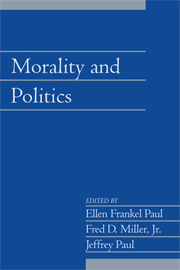Book contents
- Frontmatter
- Contents
- Introduction
- Acknowledgments
- Contributors
- What's Morality Got to Do With It? Making the Right Distinctions
- Unauthorized Humanitarian Intervention
- Thinking Constitutionally: The Problem of Deliberative Democracy
- Representing Ignorance
- Dual Citizenship and American Democracy: Patriotism, National Attachment, and National Identity
- Policy Implications of Zero Discounting: An Exploration in Politics and Morality
- Reflections on Espionage
- Mr. Pinocchio Goes to Washington: Lying in Politics
- A Subject of Distaste; An Object of Judgment
- Against Civic Schooling
- Political Morality as Convention
- Autonomy and Empathy
- God's Image and Egalitarian Politics
- Should political Liberals Be Compassionate Conservatives? Philosophical Foundations of the Faith-Based Initiative
- Index
Reflections on Espionage
Published online by Cambridge University Press: 04 August 2010
- Frontmatter
- Contents
- Introduction
- Acknowledgments
- Contributors
- What's Morality Got to Do With It? Making the Right Distinctions
- Unauthorized Humanitarian Intervention
- Thinking Constitutionally: The Problem of Deliberative Democracy
- Representing Ignorance
- Dual Citizenship and American Democracy: Patriotism, National Attachment, and National Identity
- Policy Implications of Zero Discounting: An Exploration in Politics and Morality
- Reflections on Espionage
- Mr. Pinocchio Goes to Washington: Lying in Politics
- A Subject of Distaste; An Object of Judgment
- Against Civic Schooling
- Political Morality as Convention
- Autonomy and Empathy
- God's Image and Egalitarian Politics
- Should political Liberals Be Compassionate Conservatives? Philosophical Foundations of the Faith-Based Initiative
- Index
Summary
INTRODUCTION
In 1995 the United States National Security Agency (NSA), the Central Intelligence Agency (CIA), and the Federal Bureau of Investigation (FBI) made public the story of a forty-year American intelligence operation code-named Venona. Shortly after the Nazi-Soviet Pact in 1939, American military intelligence had ordered companies that were sending and receiving coded cables overseas, such as Western Union, to turn over copies to the U.S. government. Hundreds of thousands of cables were sent or received by Soviet government bodies. Beginning in 1943, spurred by rumors and concerns that Stalin might conclude a separate peace with Hitler, the U.S. Army's cryptographic section began work trying to read these Russian cables. It had very limited success until 1946, by which time the Cold War was already underway. Some twenty-nine hundred cables dealing with Russian intelligence activities from 1942 to 1946 eventually were decrypted successfully in whole or in part as a result of Soviet technical errors in constructing and using “one-time pads” that American code-breakers were able to exploit. These cables implicated more than three hundred Americans as having been involved with Soviet intelligence services during World War II, a time when the United States and the USSR were allies.
The Venona documents have sparked a renewed interest in issues of espionage, although in truth there has hardly been a time in the past fifty years that espionage has not generated public fascination, not only in the United States but also in Great Britain.
- Type
- Chapter
- Information
- Morality and Politics , pp. 141 - 166Publisher: Cambridge University PressPrint publication year: 2004



